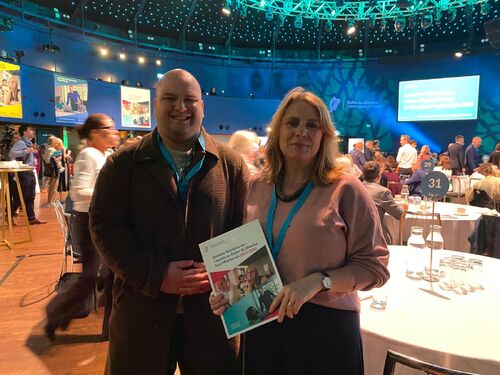DFI welcomes the new National Disability Strategy, and urges whole-of-government action to deliver change
September 3 2025

DFI welcomed today’s launch of the new National Human Rights Strategy for Disabled People 2025 - 2030, while stressing that its success will depend on strong implementation, cross-departmental leadership, and sustained investment.
This is the first national disability strategy since Ireland ratified the UN Convention on the Rights of Persons with Disabilities (UN CRPD), and since responsibility for disability policy moved to the Department of Children, Disability and Equality (DCDE). The strategy was developed following broad consultation, including engagement with Disabled Persons’ Organisations (DPOs). Many of DFI’s members offered their expertise, insights and community concerns, during the period while the strategy was being developed.
DFI CEO Elaine Teague described the human rights focus of the strategy as a milestone moment, but warned that structural changes need to be made to ensure successful implementation.
“We welcome the human rights focus of the new National Human Rights Strategy for Disabled People and commend the depth and breadth of consultation undertaken to inform its contents. This is however just a first step, we cannot stop at words on paper, every relevant government department must step up, take responsibility, and act to remove the barriers that disabled people face in every part of life”, she said.
DFI Director of Advocacy Emer Begley called for joined-up thinking.
“Disability is often seen as the remit of a single department, but it cuts across every aspect of policy: health, housing, social protection, transport, education, employment and more. The new strategy must drive coordinated action across all of Government. This is our opportunity to move from siloed approaches to joined-up solutions that work for the whole person. We also need to see clear commitments in the forthcoming national Budget, and targeted investment in supports, to address the current exclusion and marginalisation of disabled people.”
“This strategy has the potential to change lives, but only if it’s implemented in a way that reaches people where we are. We need services that are accessible, supports that arrive when needed, and real opportunities to participate in our communities. It’s about making rights real.”
DFI emphasised that implementation will be the real measure of success.
Key requirements for successful implementation will include:
- Strong leadership and accountability throughout the lifetime of the strategy
- Detailed implementation plans
- Sustainable funding to meet commitments
- A skilled workforce and better public understanding of disability
- Simpler, more accessible routes to services and supports.
DFI stands ready to play our role also. To support delivery of the strategy and its ambitions, we will:
- Analyse the strategy carefully and provide feedback.
- Monitor the implementation of the strategy, including the forthcoming Action Plans.
- Work alongside our members in ongoing advocacy towards stronger disability policy.
- Engage with all stakeholders include government, civil society and DPOs.
Ms Teague concluded by calling for an ambitious approach to implementation.
“Ireland has the chance to lead by example in making the rights of disabled people a reality. The National Disability Strategy can be the blueprint, but it will take ambition, determination, and partnership with disabled people every step of the way.
For media queries
Email: info@disability-federation.ie
Phone: +353 1 454 7978
Disability statistics
For a national disability profile, see our factsheet.
For county-by-county disability profiles, see our factsheets.
